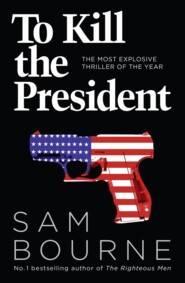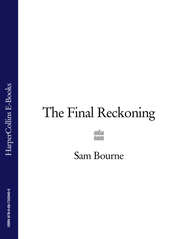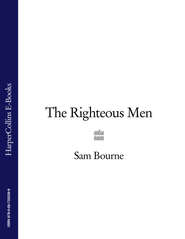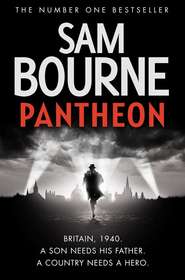По всем вопросам обращайтесь на: info@litportal.ru
(©) 2003-2024.
✖
The Chosen One
Автор
Год написания книги
2019
Настройки чтения
Размер шрифта
Высота строк
Поля
‘Mr President, congratulations on signing the Violence Against Women Act.’
‘Thanks.’ He flashed the wide signature smile.
‘But some people are saying this might be the first and last legislative achievement of the Baker presidency. This was the one thing you and Congress could agree on. After this, isn’t it going to be gridlock all the way?’
‘No, Terry, and I’ll tell you why.’
Maggie watched as the President went into a now-familiar riff, explaining that though his majorities in the House and Senate were narrow, there were plenty of people of goodwill who wanted to make progress for the sake of the American people.
He then took another question, this time on diplomatic efforts in the Middle East. Maggie felt a surge of anxiety, a leftover from the election campaign when it had been her job to make sure he didn’t stumble on the subject of foreign policy. No need for her to worry about that now.
Sanchez leaned in to say, ‘This will be the last question.’
Baker called on MSNBC.
‘Mr President, I’m sorry to come to a subject that might be awkward. Did you deceive the American people during the election campaign, by failing to reveal a key aspect of your own medical history – specifically the fact that you had once received treatment for a psychiatric disorder?’
FOUR (#ulink_323f1c7e-871e-594f-a90a-40f5f5f58e1f)
Washington, DC, Monday March 20, 09.24
There were perhaps two seconds of frozen silence as the question cut through the air, like a missile before impact.
Every head in the room swung around to look at Stephen Baker. His posture had remained the same, he had not collapsed in a heap, nor was he shaking his fist. But, Maggie saw, he was now gripping the lectern so tightly his knuckles had turned white. They matched the pallor spreading over his face as the blood drained from it.
He began to speak. ‘Like every other candidate for this office, I released a medical statement during the campaign. From my doctor. That statement included all the details he—’ Baker paused, looking down at the lectern as if searching for a script that wasn’t there. The pause, barely a second, seemed interminable. He looked up again. ‘All the details he deemed to be relevant. And I think now is the time to attend to the business of the American people.’ With that, he turned on his feet and headed for the door, a long snake of aides at his heels – leaving behind a loud chorus of ‘Mr President!’ bellowed by every reporter with a follow-up question.
The staff scattered in every direction. Goldstein, Maggie noticed, headed straight across the corridor towards the Oval Office; MacDonald and Sanchez went in the opposite direction, to the press room. En route to her own office, one of several bunched together next to the Press Secretary’s, she hesitated, standing in the doorway, looking in at those charged with handling the media: the scene was crazed, every person on a telephone, each one of them simultaneously hammering away at a computer. She could see MacDonald and Sanchez talking intensely: she lip-read Sanchez saying, ‘The trouble is, he looked like shit out there.’
Maggie felt both out of place and useless, like a sightseer at a fire station on full alert. With a start, she remembered her meeting with Magnus Longley that morning, his threat that her job hung by a thread. Soon she might indeed be no more than a sightseer here.
She turned to leave, taking one last glance at the TV screen. The Breaking News tag along the bottom conveyed a single, devastating sentence: ‘Source tells MSNBC: President Baker received psychiatric treatment for depression.’
No wonder Baker had turned the colour of ash. The word psychiatric reeked of political death. People might like to brag they were liberal and tolerant these days, but mental illness? Different story. Maybe if you were a celebrity, perched on Oprah’s sofa, admitting to a few years of therapy . . . But psychiatric treatment: that sounded like electrodes, rubber rooms and men in white coats. It was One Flew Over the Cuckoo’s Nest.
Besides, Stephen Baker was not a movie star who could weep a few confessional tears on daytime TV and make it go away. He was the President of the United States. Americans could tolerate all manner of weaknesses in each other – especially if they were accompanied by contrition and redemption – but not in a president. They needed their president to be above all that, to be stronger than they were. Few men ever met that impossible standard. But a nation that looked to its leader to be a kind of tribal father never stopped expecting.
Voters would be rattled by this news, whoever was in the White House, Maggie knew that. But Stephen Baker had been lionized, ever since his campaign took off in the depths of the Iowa winter. Word had spread that, at last, a different kind of politician had arrived: one who really did seem to talk straight.
YouTube clips of him telling audiences what they didn’t want to hear became cult viewing. He told farmers outside Sioux Falls that ethanol subsidies would have to stop: growing corn to make oil made as much sense as distilling the finest whisky – then using it to clean out the drains. There had been some hecklers, but most of the crowd of farmers were slack-jawed. No candidate had ever dared to say such a thing, not to their face anyway. How come this guy wasn’t pandering to them like everyone else had?
‘I hate what you say, but it took some guts to come here and say it!’ shouted one woman, as wide as a truck, from the front row. Soon they were nodding and then they began applauding, more surprised by themselves than by the candidate standing before them. The three-minute video went viral.
Soon the press was writing up Baker as something more than a regular politician. He was a truth-teller, destined to lead the American people out of a dark moment in their history. The more overheated reporters became lyrical: ‘Cometh the hour, cometh the man . . .’ What could have been an uncomfortable report in The New Republic, detailing some of the battles Governor Baker had fought, and the enemies he had made, in his home state of Washington concluded by quoting Jesus: ‘Only in his hometown . . . is a prophet without honour.’
Yet now he had been accused of failing to level with the nation. And instead of knocking back the charge, he had paled at the very words.
Maggie was stepping into her office when she saw Goldstein heading away from the Oval and towards the press area. No matter that he was way above her in the Washington food chain, Maggie regarded Stu as one of the few unambiguously friendly faces around here. They had whiled away many long hours on the plane during the campaign, talking while reporters tapped away at their keyboards, staffers dozed and Baker sat back, his iPod headphones jammed into his ears to prevent anyone attempting a conversation. She figured that if anyone knew the truth of the MSNBC story, it would be Goldstein – the man who’d been with Stephen Baker from the start.
She walked down the corridor so that she could meet him halfway, then cut to the chase. ‘We’re in the toilet, aren’t we?’
‘Yup. Somewhere round the U-bend and heading underground.’ He carried on walking. Given his bulk, he was advancing at quite a speed.
‘Is it true?’
‘Tell you what, why don’t you go over to the Oval right now, poke your head round the door and say, “Mr President, is it true that you used to see a shrink ’cause you were about to throw yourself off Memorial Bridge?”’
‘They didn’t say anything about suicide.’
‘No, Maggie, they didn’t. But check Drudge in about thirty minutes. I bet that’s where they get to.’
‘Jesus.’
‘Jesus is right.’
‘How bad’s it going to be?’
‘Well, as people used to say back when Dick Nixon was using this place to turn the Constitution into confetti, it’s never the crime, it’s always the—’
‘—cover-up.’
‘Most folks won’t mind if the President’s meshugge – a real loony tune,’ he gasped, his breath too short to reach the end of his sentence. She could see crumbs embedded on his lapels. ‘Just so long as they knew about it before they pulled the lever.’
‘They’ll be angry he didn’t reveal it in the campaign.’
‘You betcha,’ he said bitterly.
She couldn’t tell whether Goldstein was irritated that something he’d long known had leaked – or whether he was disappointed that the President had kept a secret from him.
‘What’s he going to do?’
‘He wants to make a personal statement. Right away.’
‘Is that a good idea?’
‘Right now, Maggie, nothing about this is good.’
It came back to her then, the brief flap during the campaign over medical records. Mark Chester, Baker’s much older opponent, had refused to disclose his, issuing a terse ‘doctor’s summary’ instead. Most expected Baker to seize the moment and release his records in full, waving his clean bill of health in Chester’s face, each rosy-cheeked detail drawing an implicit contrast with the Republican’s pale and brief account. But he had done no such thing, choosing to issue a doctor’s summary of his own. Everyone gave Baker credit for that: he had shown compassion, sparing the embarrassment of the older man.
Now, standing in a corridor of the West Wing, Maggie wondered if they’d all been duped. She had never considered that Baker might have taken the chance to avoid full disclosure not to play nice with Chester – but to cover up his own embarrassments. But it was what everyone would be thinking now. MSNBC would either have to be flat-out wrong – which would rank as one of the major journalistic blunders of modern times – or Stephen Baker would have to come up with a damn good explanation for why he hadn’t told the truth.
She headed back to her office, sat at the computer and tried to focus on drafting an options paper on Sudan. That was what she was here to do; that was what he had asked her to do in a conversation that already seemed to belong to a different era. But now she understood why people always said that the White House could only deal with one crisis at a time. You were too distracted to think of anything else.
She clicked on the TV. All channels were now on the MSNBC story. CNN was interviewing a man claiming to be an expert on depression.
The blogs were obsessed. She went to Andrew Sullivan.
This could be a defining moment for the republic. Mental illness is one of the last great taboos, a subject kept in the dark. And yet one in three Americans is affected by it. Stephen Baker should be brave, tell the truth and call for an end to prejudice.











